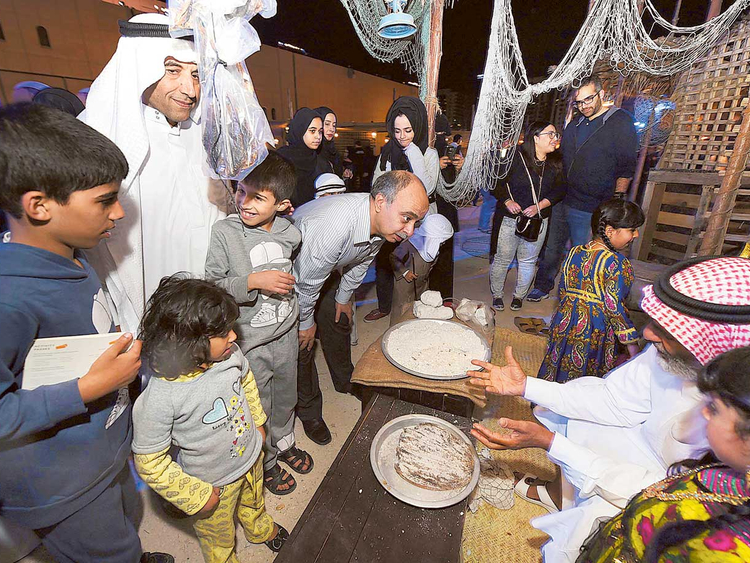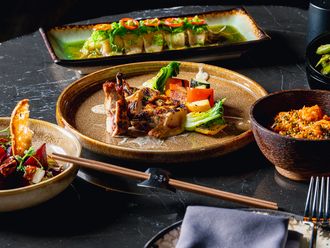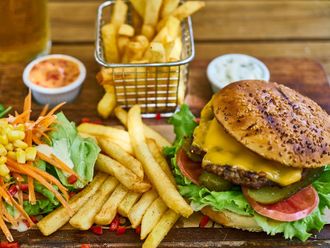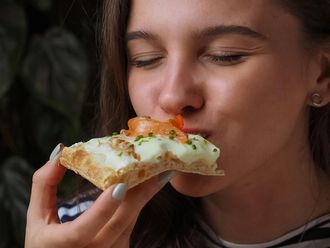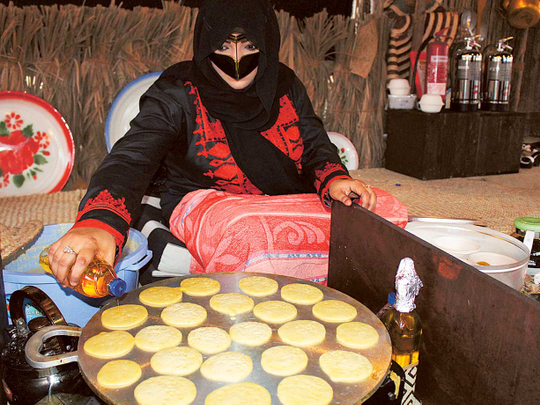
Abu Dhabi: A camel caravan passes by as Ayola performers sing and move their sticks in sync while a group of old men hammer parts of wood together to build a dhow. On another side, fishermen braid fish nets and blacksmiths make metal pots. The vignettes at Qasr Al Hosn Festival offer a panoply of Emirati culure and heritage and amidst this abundance of riches that serenade the senses is one that is arguably the most irresistible — the aroma of traditional Emirati foods being freshly prepared, available across the vast festival grounds.
At the Traditional Food Tent, a group of women sit by their stoves, making Emirati classics such as lugeimat, chubab and raghagh.
Mona from Fujairah preparing a pancake-like dish called chubab.
Ayesha, a 29-year-old from Al Ain, is preparing Lugeimat, a delectable golden sweet covered in sesame seeds and date syrup.
She scoops up some batter — made of flour, water, sugar, salt, powder milk, saffron and baking powder — and drops it into the hot oil in the shape of a perfect circle. “The secret is in the temperature of the oil,” Ayesha explains. “If it is not hot enough, they will not form a round and will soak up oil. If the oil is too hot, the batter will burn on the outside and not cook on the inside.”
When the lugeimat turn a golden colour, she ladles them out and dunks them in a giant bowl of date syrup and sesame seeds. Lugeimat is eaten as a winter food, she said.
Twenty-eight-year-old Mona from Fujairah is preparing a pancake-like dish called chubab. Made from a batter of flour, water, salt, sugar, saffron, cardamom and rose water (traditional chubab does not have the last two ingredients), chubab is primarily a breakfast dish best eaten freshly prepared.
With brisk, controlled movements, Mona pours the batter on to a hot metal plate to make mini pancakes of uniform size and thickness. A few drops of oil go atop each. “You don’t put oil on the hot metal plate, the oil has to go on top of the pancake,” Mona explains.
When bubbles form on top of the pancakes, she turns them over, pressing them against the plate. “They should be golden and not thick.”
Once she is satisfied they are the perfect golden colour, they come off the griddle. Chubab can be had with either honey or date syrup.
Mona is keen to be a part of such festivals so she can teach people about Emirati culinary traditions, she said.
On the other side of the tent, Mona’s mother, Fatima, prepares raghagh, a traditional Emirati bread made of just three ingredients: flour, salt and water.
She too uses a a griddle to cook. The way to check if the griddle is at the correct temperature, she says, is to throw a few drops of water on it. If the drops evaporate instantly, you are ready to go.
Fatima takes a handful of dough and skilfully spreads a thin layer over the hot plate. “I started to do this when I was 12. I burnt my hands many times but I wanted to learn so I continued,” she said.
After a few minutes, she lifts the bread, folds it into a triangle and places it inside a covered basket. It’s ready to be served with a dip of your choice.
Seafood
If you love seafood, head to the Gargour stall in the Marine Zone. Three tanoors (traditional ovens built into the ground) and a BBQ corner cook up various seafood treats the traditional Emirati way.
The fish are seasoned with salt and slapped on to the tanoor’s walls for about 45 minutes to slow cook, a process that lends them a lovely, smoky flavour. The barbecue shark (marinated in salt, pepper, turmeric and Arabic masala, a mix of 12 spices, is served with a choice of white or machboos rice (Arabic rice). Old Emirati bystanders jest about its consumption: do not eat too much of it at night or you won’t be able to sleep, they say. “It has a lot of protein, a lot of energy.”
Abdullah Esbiaan Al Teneiji, 58, from Ras Al Khaimah, whose stall it is, is firm that he prefers the old way of cooking. “The food tasted much better in clay pots and tanoors,” he said.
You can catch Al Teneiji curing fish on the side of the stall, happy to share his knowledge of Emirati traditions. On display at his stall are dried sardines, shark and maleh (cured fish).
Abdul Rahman Al Tunaiji shows dried salted fish to visitors in the Marine Zone of the Qasr Al Hosn Festival.
Maleh, a typical Emirati way of preserving fish, involves cleaning and removing its head and bones. The fish is sliced open, but kept in one piece. Then it is smothered in natural sea salt and placed on a 2cm thick sea salt bed in a bucket. Ten fish are stacked at a time with sea salt placed in between each and left for three days.
After three days, a heavy stone is placed on top of the fish to press them down and help squeeze out the remaining juices, covered, and left for at least one and half months.
Six weeks later, the fish, steeped in its juices, is ready to be served with a touch of lemon. It can also be cooked.
This curing process rids the fish of its smell and the meat is rendered soft, salty and slightly bitter.
The process, said Al Teneiji, owes itself to the lack of ice or refrigeration in the olden days.
Local honey
UAE is not known for its honey, but Abdullah Ali Al Danhani, 21, from Fujairah, hopes to change that with his farm-harvested honey.
Produced in Fujairah, he makes two kinds — for winter and summer. Al Danhani cultivates two varieties of bees, local and Egyptian. The result is a dark brown honey and a golden coloured one.
“No one is aware that the UAE has its own kind of honey. I hope to introduce this to people from other countries,” he said.
Coffee shop
From traditional karak, to camel or sheep milk brews with ginger or saffron, you can taste them here. Do try Namlet, a fizzy drink in different flavours served in a bottle that is stoppered with a marble. The marble is sharply pressed down to ‘open’ the bottle. Legend goes that this was UAE’s answer to the British fizzy lemonade.
There are also cooking classes for those who wish to learn traditional Emirati dishes on the spot.


